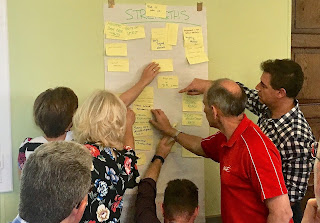 |
| MAFI CEO, Dave Fyock, opens the Global Forum meeting |
You may know all about the historic ministry work of Mission
Aviation Fellowship (MAF). But you may not be aware that today there are some
fifteen MAFs around the world. Besides the MAF organizations in the United
States and Canada, all the rest have organized themselves as spokes around the
hub of a single flight operations group called MAFI (International) with
headquarters in Ashford, UK. Every year, representatives of all these groups
gather for a global forum to praise God for what is happening and discuss the challenges
of future ministry service.
 |
| Challenging everyone with what the future of MAF might be |
I was privileged this year to be the keynote speaker for the
Forum plus spend a couple of extra days facilitating strategic planning
discussions. Altogether, I come away with a new appreciation for this great,
committed group of organizations and impressed with the way they are grappling
with the challenges of future relevancy.
Here are a few of my observations from the past four days:
- ·
New MAF resource groups are emerging from
countries that have not been traditional “players” in the mission aviation
world. Gathered with us were members of MAF Italy, France, India, Singapore,
and Philippines.
MAFI leadership team grappling with a SWOT exercise - · Although MAF-UK has been the dominate resource entity for MAFI for both funds and technical staff, MAF Switzerland is now supplying as many new pilots for field operations as anyone. This is partly due to great marketing efforts by Hans Leutwyler, MAFS CEO, and partly to a Swiss government policy that offers to pay for half of a future pilot’s flight training.
- ·
There is a strong effort to recruit pilots for
MAFI from developing countries of the Global South. A pilot training center in
Australia is focusing on this right now and
there is even the possibility that young pilots might have a chance to build experience by being employed short term as flight instructors in Singapore Airlines' basic flight school.Board members of MAF UK, Switzerland, Italy, and Norway
enjoy some Rhone valley red Beaujolais before dinner. - Although everyone believes it is still a long ways off, a joint Technology Task Force headed by MAF Canada CEO, Brad Bell, is already studying future mission applications of such things as drones and electric-powered sky taxis.
I was delighted that all these initiatives of MAFI validated
the key conclusions I had prepared for my plenary talk—namely that the next
season of mission aviation will demand thinking in new and creative ways in
order to continue “crossing barriers” and advancing God’s Kingdom around the
world.
I don’t know if I’ll ever be invited back to another MAFI Global Forum, but if they ever decide to hold it again in Lyon, France, the capital of French gastronomic cuisine, (well-proved by the chefs at our hotel!) I won’t hesitate to accept!








